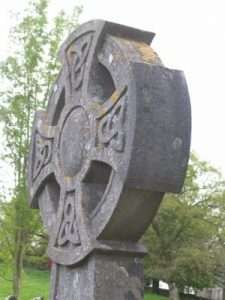Canon Moran would have found words, they might have discomfited his parishioners and caused distress to himself, but he would have found words to address the situation.
In 1981, in the pages of William Trevor’s Autumn Sunshine, one meets the gentle, gracious integrity of Canon Moran who is committed to a gospel of non-violence in times of polarised and belligerent confrontation. Moran has ministered for years in his little parish in Co Wexford, and is confronted with the violent and angry republicanism of his daughter’s partner, who saw the events of 1798 through the prism of a later revolutionary socialism:
“The following morning Canon Moran conducted his services in St Michael’s, addressing his small Protestant congregation, twelve at Holy Communion, eighteen at morning service. He had prepared a sermon about repentance, taking as his text St Luke, 15:32: ‘ … for this thy brother was dead, and is alive again; and was lost, and is found.’ But at the last moment he changed his mind and spoke instead of the incident in Kinsella’s Barn nearly two centuries ago. He tried to make the point that one horror should not fuel another, that passing time contained its own forgiveness.
“The man Kinsella was innocent of everything,’ he heard his voice insisting in his church. “He should never have been murdered also.”
Harold would have delighted in the vengeance exacted on an innocent man. Harold wanted to inflict pain, to cause suffering and destruction. The end justified the means for Harold, even if the end was an artificial one, a pettiness grandly dressed up. In his sermon Canon Moran spoke of such matters without mentioning Harold’s name. He spoke of how evil drained people of their humour and compassion, how people pretended even to themselves
He could tell that his parishioners found his sermon odd, and he didn’t blame them. He was confused, and naturally distressed.”
Canon Moran, in his gentle, unassuming way stood against the spirit of his times, it would have been easier to have gone with the prevailing opinion, to have acknowledged the mood of those around them and not to have caused confusion.
Standing against the crowd does not win friends and influence people, particularly Christians convinced of their own correctness. The Church Times carries a report on Baptist pastor Steve Chalke examining the promiscuous and exploitative culture of ancient Rome and pointing out that Saint Paul’s writing on same sex relationships should be read against the background of that culture.
When he first declared himself in favour of the church affirming same sex relationships, Steve Chalke clearly discomfited the members of the evangelical community to which he belonged because his Oasis Trust, which had achieved so much in urban communities, was expelled from the Evangelical Alliance. Perhaps, like William Trevor’s Canon Moran, he felt confused and distressed himself, perhaps people thought him odd.
Canon Moran speaks of people pretending, “even to themselves.” Perhaps, the church is full of such pretence, people who accept gay and lesbian people in their everyday lives and who adhere to a rigid judgementalism when it comes to the life of the church. Canon Moran proved right in the end, his non-violence was the way to peace. Steve Chalke will undoubtedly be proven right in the end; the pity is the amount of unnecessary pain will be caused by those who refused to be discomforted.
